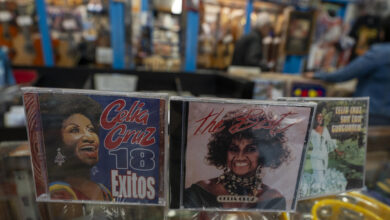Hoaxes, Digital media, Activism and 11J: This is How Cuba Changed in Five Years of Mobile Data
Five years ago, the introduction of mobile data in Cuba marked a fundamental shift, spurring shifts from anti-government protests to a rise in digital activism and independent media, reshaping the nation's sociopolitical landscape.

12/23/2023.- A person uses his cell phone with internet access, in Havana (Cuba). EFE/Yander Zamora
EFE
Escucha este artículo
Leer en español: Bulos, medios digitales, activismo y 11J: Así cambió Cuba en cinco años de datos móviles
The arrival of mobile data in Cuba, five years ago, is key to explaining certain changes in the country, ranging from the anti-government protests of July 11, 2021, to the avalanche of hoaxes and memes, through the role of activism and independent media.
In December 2018, the deployment of 3G technology began a service that meant a great leap for an island until then disconnected from the global technological revolution.
Cuba is now a different country, with a Government very present in networks -although with disparate results-, an agile ecosystem of unofficial media, and a growing society, connected to a multifaceted reality, outlined by a multiplicity of voices.
Independent journalists, activists, YouTubers, and influencers have also been detained and harassed for their activity on networks after the approval of legal changes such as the controversial Decree 370 or the new Penal Code. Dozens of them have left the country.
In these years, Cuban versions of applications such as eBay (Revolico), Uber (La Nave), and Glovo (Mandao) have flourished; successful YouTubers and memes; community solidarity networks; state payment platforms; campaigns that have put femicides on the political agenda; and even a unified rate of the value of the dollar on the street.
According to data provided to EFE by the state telecommunications monopoly ETECSA, currently 6.8 million Cubans – nearly two-thirds of the population – have mobile internet.
Since 2019, more than a million new users have been added each year, which has called into question the available bandwidth.
A "turning point"
The arrival of mobile data was a "very important turning point for Cuban society" and "a shock" for the Government, independent journalist Yoani Sánchez, director of 14yMedio, one of the oldest digital networks on the island, told EFE.
Historian, essayist, and editor Alina Bárbara López Hernández explains to EFE that the decision had to do with the thaw between Havana and Washington in previous years, but also with the attempt to promote international tourism and foreign investment.
This, this critical intellectual argues, has created a "very tense situation" where the policy's claim to maintain total control clashes with the opening of access to networks: "The Internet goes against the heart of the political system."
Regarding the consequences, López highlights first of all "the emergence of an active citizenry", which previously existed but was "absolutely disfigured and made invisible", and the emergence of "a voice in the face of power." "Before, dissent was not so active," he emphasizes.
Social differences have also increased, as he points out, due to the digital divide – which causes vulnerable sectors to be "left behind" – and some left-wing international actors, in light of these new voices from the island, are rethinking their relationship. with the Cuban Government.
The Government on the Internet
Sociologist Rafael Hernández, director of the analysis magazine Temas, in the orbit of the ruling party, believes that the arrival of the mobile internet helped "expand communication vehicles and networks that already existed in Cuba," and that the Cuban Government had already naturalized the dissent previously.
"The Government accepted this challenge because it has a president (Miguel Díaz-Canel) who is a telecommunications engineer. He is not naive or ignorant," says Hernández, who highlights the "communication intention" of the current Executive.
He considers that the Cuban Government "has not yet learned at all levels" to use the Internet and that its communication "is not effective enough." These "deficiencies," he adds, "have to do with speech," with "knowing how to project oneself" and identify one's interlocutor, who sometimes disagrees.
Sánchez, for his part, sees the ruling party's communications as "clumsy" and "stiff", full of "permanent confrontation" and "barricade vocabulary" due to a lack of "debate training." That makes him think that the emergence of the ruling party on the networks "has taken away more than it has given them."
Challenges of the Independent Press in Cuba
The journalist considers that despite the "inequality" between official and alternative media, it seems that the latter always arrives first. Sánchez recalls the blocking from national servers of pages such as that of the site he directs and denounces the internet cuts suffered by independent journalists.
Questioned about this, ETECSA assured EFE about the censored pages that access to certain content may be limited by "regulations regarding Information and Communication Technologies existing in the country."
Also read: China Refutes Costa Rica's 5G Concerns Amidst Growing Tech Tensions
Reports of Blackouts and International Context
In recent years, specialized international organizations have reported several widespread internet blackouts on the island, often related to anti-government protests such as those of 11J, but also with those of October 2022.
Despite these tensions, Sánchez believes that the Cuban Government cannot back down: "The political cost would be quite high." López agrees: "There is no one to stop this."
Hernández, for his part, summarizes it like this: "In Cuba, the challenge is that Facebook and Google are available on anyone's cell phone and that is not China or Vietnam or other countries."




